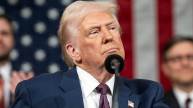As the U.S.-Canada trade conflict over tariffs on Canadian goods escalates, Prime Minister Justin Trudeau has issued a stark warning to U.S. President Donald Trump. Trudeau stated that if the U.S. imposes unjustified tariffs on Canadian goods, Canada will retaliate forcefully. “We will continue to work to prevent these tariffs, but if unjustified tariffs are imposed on Canada this Tuesday, we will respond immediately and with extreme strength, as Canadians expect,” Trudeau said, as quoted by CBC News.
The remarks come amid rising trade tensions between the two nations, with Trump accusing Canada and Mexico of failing to curb the flow of illicit drugs, particularly fentanyl, into the United States.
Trump, who has repeatedly spoken out about the fentanyl crisis in the U.S., argues that the tariffs are a necessary measure to push Canada and Mexico to strengthen their border security.
As a result, Trump has decided to move forward with the imposition of tariffs on both countries, starting March 4. Additionally, reciprocal tariffs are set to continue with full force from April 2.
What Trudeau Said
Trudeau added that, “the first thing on tariffs is to emphasise that our government, and indeed all of Team Canada, premiers, business leaders, community leaders, are focused on one thing, making sure that come Tuesday and for the weeks that follow, there are no tariffs imposed on Canada,” as per CBC News.
“The tariffs that the president speaks of for next week are centered around the fentanyl crisis that they’re facing in the United States, but that we are also facing in Canada,” he added.
Trump’s Tariff’s On Canada- History
In March 2018, he imposed tariffs on steel (25%) and aluminum (10%) from most countries,[2][3][4] which, according to Morgan Stanley, covered an estimated 4.1% of U.S. imports.[5] In June 2018, this was extended to the European Union, Canada, and Mexico. This move shocked Canada, which has long been a close trade partner of the U.S.
In response, Canada imposed reciprocal tariffs on $16.6 billion worth of U.S. goods, including steel, aluminum, and other products like whiskey, ketchup, and dairy.
Canadian Prime Minister Justin Trudeau condemned the tariffs as “insulting” given the close U.S.-Canada alliance.
This dispute escalated further that during the G7 Summit in 2018, Trump and Trudeau had a public fallout.
Trump called Trudeau “weak” and “dishonest” on Twitter after Trudeau criticized the tariffs in a press conference.
Finally, In May 2019, after months of negotiations, the U.S. and Canada agreed to remove tariffs on steel and aluminum. In August 2020 also Trump tried to impose 10% tariff on Canadian aluminium, which was later dropped to avoid further escalation.
Measures Trump Is Taking
On February 4, the U.S. temporarily halted tariffs for 30 days after Trump secured border security commitments from Canada and Mexico. Also, reciprocal tariffs are set to continue with full force from April 2. However, due to ongoing drug smuggling concerns, Trump has decided to resume trade penalties, which include a 10% tariff on Chinese imports. This suggests that Trump sees tariffs as a tool to enforce stricter border controls and is willing to use economic pressure to address issues like drug trafficking.
Trump has already highlighted the alarming influx of illicit drugs, including fentanyl, into the United States. he claimed that these import taxes would incentivize other nations to take stronger action against trafficking. “We cannot allow this scourge to continue to harm the USA, and therefore, until it stops, or is seriously limited, the proposed TARIFFS scheduled to go into effect on MARCH FOURTH will, indeed, go into effect, as scheduled,” the Republican president wrote on X. “China will likewise be charged an additional 10% Tariff on that date.”












